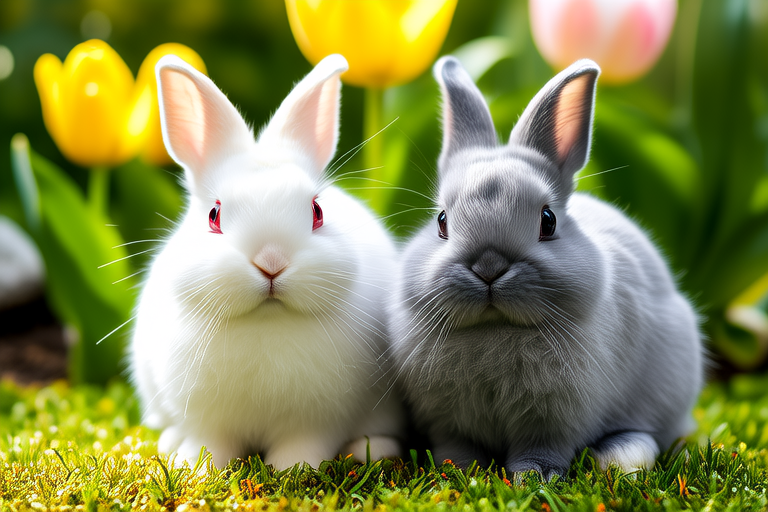Adorable Dutch Dwarf Rabbits: The Ultimate Guide for First-Time Owners
Welcome to the wonderful world of Dutch dwarf rabbits! These charming little creatures have become increasingly popular among pet enthusiasts due to their compact size, friendly demeanor, and easy care. This comprehensive guide will provide you with all the information you need to successfully care for your new Dutch dwarf rabbit, ensuring both you and your furry friend enjoy a happy, healthy life together.
The Unique Characteristics of Dutch Dwarf Rabbits
Dutch dwarf rabbits are one of the smallest breeds of domestic rabbits, typically weighing between 2 and 3 pounds. Their most distinctive feature is their striking black and white coloration, which gives them a classic ‘Dutch’ look. These rabbits are known for their gentle nature, making them ideal companions for first-time rabbit owners. They are also highly intelligent and can be trained to perform simple tasks, such as coming when called or using a litter box.
Ideal Living Environments for Dutch Dwarf Rabbits
Creating a safe and comfortable environment is crucial for the well-being of your Dutch dwarf rabbit. A spacious indoor cage is recommended, with dimensions of at least 3 feet by 4 feet to allow ample room for movement. The cage should be equipped with a solid floor, soft bedding material like straw or shredded paper, and a hideaway area for privacy. Providing a secure outdoor hutch during warmer months can also be beneficial, but always ensure it’s predator-proof and weather-appropriate.
Dietary Needs of Dutch Dwarf Rabbits
A balanced diet is essential for maintaining your rabbit’s health. The core of their diet should consist of unlimited access to high-quality hay, such as timothy hay, which aids digestion and dental health. Fresh vegetables and fruits can be offered in moderation, focusing on nutrient-rich options like carrots, spinach, and apples. Pellets formulated specifically for small breeds should be provided in limited quantities to avoid overfeeding. Always introduce new foods gradually to prevent digestive upset.
Grooming Requirements for Dutch Dwarf Rabbits
Grooming your Dutch dwarf rabbit regularly helps maintain their coat’s cleanliness and prevents hairballs. Brushing their fur once or twice a week with a soft-bristled brush is sufficient, especially during shedding seasons. Additionally, trimming their nails every few weeks and checking their ears for any signs of infection are important maintenance tasks. Bathing is generally unnecessary unless absolutely required, as it can cause stress and disrupt their natural oils.
Common Health Issues in Dutch Dwarf Rabbits
Like any pet, Dutch dwarf rabbits are susceptible to certain health problems. Dental issues are particularly common, often resulting from improper diet or genetics. Regular veterinary check-ups can help catch potential problems early. Gastrointestinal stasis, a condition where the digestive system slows down or stops functioning, requires immediate attention. Other concerns include respiratory infections and skin disorders, which can usually be managed with proper care and prompt medical intervention.
Tips for Socializing and Training Your Dutch Dwarf Rabbit
Socializing your Dutch dwarf rabbit from an early age encourages friendly behavior and strengthens the bond between you and your pet. Spend time handling and interacting with them daily, offering treats as positive reinforcement. Training techniques, such as clicker training, can teach your rabbit simple commands and tricks, enhancing their mental stimulation. Always use patience and consistency during training sessions to ensure a rewarding experience for both you and your rabbit.
Selecting the Right Accessories and Toys
Toys and accessories enrich your Dutch dwarf rabbit’s environment and promote physical activity. Chew toys made from untreated wood or cardboard satisfy their natural chewing instincts and help wear down their teeth. Exercise balls or tunnels provide opportunities for exploration and play. Litter boxes filled with absorbent material encourage proper waste management. Providing a variety of stimulating items ensures your rabbit remains entertained and engaged throughout the day.
Routine Veterinary Care for Dutch Dwarf Rabbits
Regular visits to a veterinarian experienced with rabbits are vital for preventive healthcare. Annual check-ups allow for early detection of health issues and timely vaccinations. Spaying or neutering your rabbit is highly recommended, as it reduces the risk of certain cancers and unwanted behaviors. Discuss specific care needs with your vet based on your rabbit’s age, breed, and overall health status to tailor a care plan that best suits their individual requirements.
In conclusion, owning a Dutch dwarf rabbit can be a delightful and fulfilling experience when provided with appropriate care and attention. By familiarizing yourself with their unique characteristics, dietary needs, grooming requirements, and potential health concerns, you’ll be well-equipped to give your pet a loving home. Remember, patience, affection, and consistent care are key elements in nurturing a strong relationship with your adorable Dutch dwarf rabbit.
